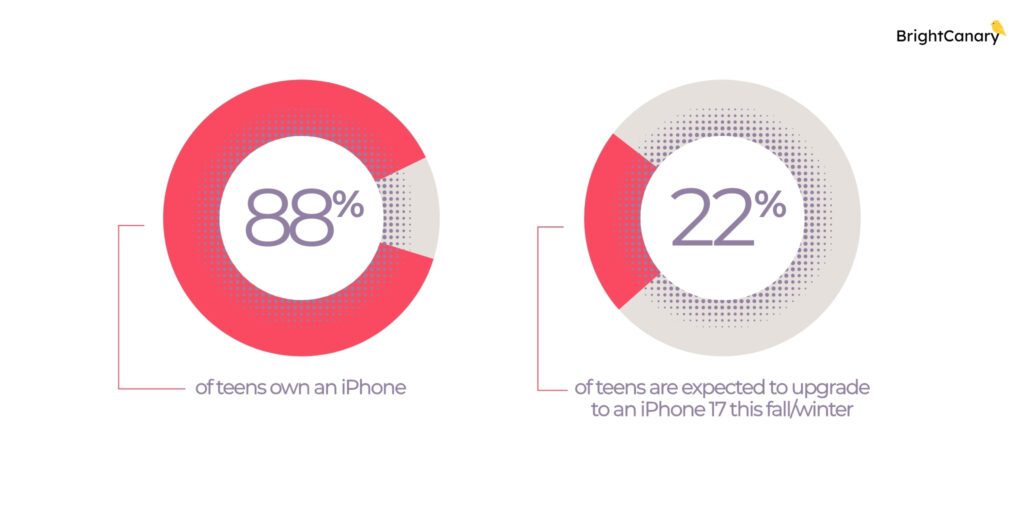
Welcome to Parent Pixels, a parenting newsletter filled with practical advice, news, and resources to support you and your kids in the digital age. This week:
📱Majority of teens use iPhones, Instagram, and Netflix: Android users are feeling lonely these days. An overwhelming majority (88%) of teens own an iPhone, and 25% of teens are expected to upgrade to an iPhone 17 later this year. That data comes from the latest Piper Sandler survey of more than 6,000 teens (average age: 16.2 years). Other highlights from the survey:
Our take: If your teen doesn’t have an iPhone, expect pressure from their friends about it. Now’s a good time to talk about how to navigate peer pressure together, and if you do decide to give them an iPhone, make sure you take time to set up free Apple parental controls.
🪣 Why do kids fall for social media trends? If you’ve seen your feed flooded with AI-generated Studio Ghibli-style images lately, you're witnessing the latest viral social media trend. But why do these trends spread so fast—and how might they influence your teen? A recent Psychology Today article breaks it down:
Herd mentality: Teens are hardwired to seek belonging. When everyone is jumping on a trend, it feels natural, and even necessary, to join in. Not participating feels like being left out of an inside joke.
Identity exploration: Trends offer a low-stakes way for teens to try on different versions of themselves and signal who they are (or who they want to be).
Dopamine boost: Every like, share, and positive comment triggers the brain’s reward system, making social media feel even more addictive.
Not all trends are harmless. Risky challenges like the "Blackout Challenge" or the "Tide Pod Challenge" exploit the same psychological wiring: peer pressure, the search for approval, and the need to fit in. Teens may engage in risky behavior without fully understanding the consequences.
Talk to your teen about why trends are so tempting — and why not every trend is worth following. Remind them that it’s okay to sit out a trend, even if everyone else seems to be doing it.
🥱 Social media before bedtime is wrecking your child’s sleep quality: Here’s yet another reason to keep phones out of the bedroom. A new study found that late-night social media use — specifically, scrolling through emotionally charged (doomscrolling, political posts) and comparing oneself to others — is linked to poor sleep quality. As one of the study’s co-authors, Brian Chin, writes on The Conversation, “In other words, that late-night scroll isn’t harmless − it’s quietly rewiring your sleep and well-being.”
The study focused on people between the ages of 18–30, but the findings are even more alarming when we think about our kids and their developing brains. We recommend keeping phones out of the bedroom and winding down an hour before bed. Bonus points if you do this as a family — here are 11 of our favorite screen-free activities to help everyone unplug and relax before lights out.
Parent Pixels is a biweekly newsletter filled with practical advice, news, and resources to support you and your kids in the digital age. Want this newsletter delivered to your inbox a day early? Subscribe here.
Let’s talk about peer pressure. Whether it’s a friend pushing your teen to upgrade their phone (sorry, green bubble crew) or encouraging them to do something that feels wrong, it’s important to help your teen recognize peer pressure and know when to step back — or ask an adult for help. Here are a few ways to start the conversation.
🔒 Meta recently announced more teen safety features across its platforms: teens can no longer use Instagram Live unless a parent or guardian enables the feature, and any potentially explicit images in direct messages will automatically be blurred for users under 16. (Seems like those should have been implemented years ago, but hey, better late than never.) Instagram’s Teen Accounts, which feature built-in privacy and content controls, are also rolling out to Facebook and Messenger.
🚬 Are Google, X, and Facebook modern-day tobacco companies? Check out this opinion article in Scientific American and let us know what you think.
🎮 Is your child on Roblox? Take a closer look at their privacy settings and who they interact with on the platform. The Guardian reports that Roblox is exposing children to grooming, pornography, violent content, and abusive speech. Here’s our guide to Roblox parental controls.